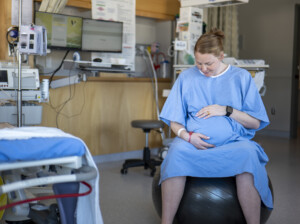If you’re pregnant for the first time (or maybe even subsequent times), when you’re finally rounding third base and heading home during your pregnancy — you’re probably dying to know if you’re going into labor. If it’s your first time, it’s so anxiety-inducing not knowing what labor feels like (other than what you’ve heard, which is probably extremely painful). It feels like you’re constantly monitoring every little thing your body does, hoping it means it’s almost time to vacate that baby from the premises.
Suddenly, everything seems like you may potentially be going into labor. Feel some indigestion from dinner? You may mistake some gas pains for labor pains. Or maybe that was just me every other day, a week before my baby’s due date. All people who have been pregnant before have been there. You probably have your speculated due date marked in your calendar in bright red permanent marker. You’re counting the weeks, days, hours, minutes, and even seconds — I feel you.
So what are the actual early signs of labor, and what are only instances of wishful thinking? Below are some early signs of labor — and what aren’t — so you’ll be prepared to call the hospital, birthing center, or your midwife to let them know it is “go time.”
Is the baby feeling low and engaged an early sign of labor?
I remember feeling like if I sneezed, my son would fall out of my vagina at the end of my pregnancy. As I waddled around, I kept thinking that surely the end was near.
However, engagement is unrelated to the timing of labor and delivery. Your baby may engage weeks before labor if it’s your first! You won’t necessarily experience engagement with future births until labor contractions begin, but it could signify what’s coming.1
Is more cervical discharge an early sign of labor?
To get pregnant, many women become obsessed with their discharge, as gross as that sounds. But it turns out, the consistency, amount, and even color can indicate where you are in your cycle and how fertile you are — and how likely you’ll conceive a baby if you hit the sheets. Focusing on your cervical mucus doesn’t stop once you become pregnant. Increased discharge can potentially be an indicator of labor. Discharge that’s clear, pink, or slightly bloody might happen several days before labor begins or at the start of labor.2
If the discharge is tinged with blood, that’s another story.
Is “bloody show” an early sign of labor?
If your discharge is tinged with blood, it could be a “bloody show,” which indicates that your cervix is beginning to open.3 Bloody show is a common symptom in late pregnancy because your cervix is starting to soften, which makes room for the baby to come out. It’s a combination of the blood vessels, which bleed easily when dilating, and the mucus from your mucus plug.3 Isn’t pregnancy a beautiful, beautiful thing?
Bloody show, if paired with contractions, may be a sign of early labor or active labor.3 So, it’s almost go time.
Is losing your mucus plug an early sign of labor?
According to the Cleveland Clinic, your mucus plug blocks the opening of your cervix during pregnancy to keep your baby safe from bacteria. And when it pops out, this is from your cervix softening and expanding.3 So, does losing this little barricade mean you can expect your baby soon?
Unfortunately, you could still carry your baby for several more weeks, even after losing your mucus plug. But most of the time, it could mean labor is near because your cervix’s ripening and softening is a sign of early labor.4
Braxton Hicks isn’t an early sign of labor.
Unfortunately — though they sometimes certainly feel like real labor contractions — Braxton Hicks isn’t an early sign of labor. I remember feeling them throughout my pregnancy, even one time leading me to the hospital to ensure I wasn’t going into labor prematurely, but thankfully, I was not. FYI – sex can cause Braxton Hicks contractions . . . so maybe I’ll save you a trip to the hospital if you find yourself hitting the sheets with your partner.
Braxton Hicks contractions are your body’s way of getting ready for real contractions and are often called “false” labor pains.5 They aren’t usually painful, don’t have a pattern, or last longer or get stronger. Most of the time, they taper off and disappear, typically occurring during your third trimester but sometimes as early as your second.5
Diarrhea — early labor sign or food poisoning?
If you spent some time trying to conceive, you probably played the two-week waiting game: Is this an early pregnancy symptom, is it PMS, or is it a stomach virus? And even in pregnancy, this guessing game doesn’t stop. If you have diarrhea in late pregnancy, you’re now playing the game: Is this diarrhea a sign of early labor, or do I have a stomach bug?
Diarrhea could be a sign to help you know if you’re going into labor, especially if you’re dealing with it close to your due date.6 Or, maybe you just ate some food that didn’t sit well, or you’re sick with a stomach virus. Because of this, diarrhea on its own is not a reliable indicator of labor. The American Pregnancy Association (APA) says diarrhea could signify that labor is near, but other signs of labor need to be present.6 Stay hydrated and call your doctor if you’re experiencing diarrhea and fever. It’s probably not early labor but a stomach virus or food poisoning.7
WebMD says, however, that stomach cramping or pain that comes and goes with regularity could be a sign of labor, like contractions coming at regular intervals and lasting about 60-90 seconds, and getting closer together. And with some contractions comes back pain, and if that pain regularly comes and goes in a pattern, and the sensation increases in intensity, it could also be a sign of early labor.8
Back pain could be an early labor sign.
While back pain throughout pregnancy is normal, there’s a difference between that back pain and the back pain you feel when it’s an early labor sign. Back labor is a discomfort in your lower back and is most uncomfortable during contractions. And it may feel like spasms as it comes and goes.9
While it may be challenging to know if you’re going into labor, hopefully, this narrowed some confusion down for you. To sum it up, if you’re feeling back pain in regular patterns, experiencing diarrhea and other symptoms (but not fever), losing your mucus plug, noticing an increase in cervical discharge, and feeling mild period-like cramps — you could be experiencing signs of early labor. Be sure to call your healthcare provider or birthing team if you’re concerned.
Trust those mama instincts. Good luck — soon, you’ll have that baby in your arms.




































